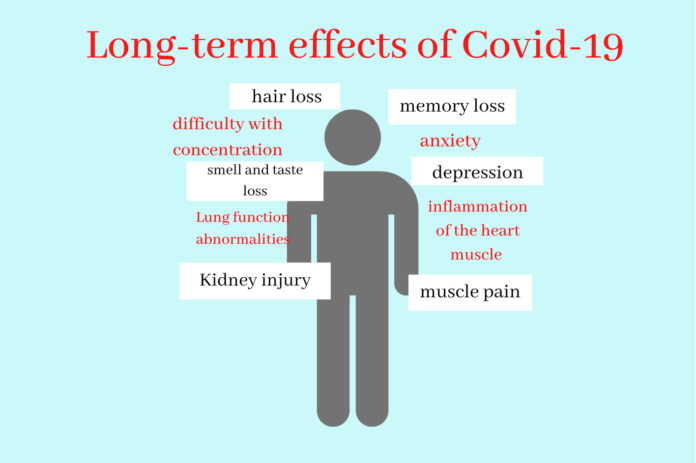By Emily Cousins | Staff Writer
The fear of getting COVID-19 and dying is a prevalent anxiety for many, but even after recovering, there are some common long-term issues that can even be permanent.
According to the Centers for Disease Control and Prevention, the most commonly reported long term effects of COVID-19 are fatigue, shortness of breath, chest pain, joint pain and a cough. It’s also possible to suffer from depression, muscle pain, headache, intermittent fever, heart palpitations and brain fog.
Some more severe effects can affect any or all of the organ systems in the body. The CDC is still investigating these reports and working to find out if these are permanent.
Dr. Michael Muehlenbein, professor and chair of the department of anthropology and infectious disease epidemiologist, said these long term effects are common in COVID-19 patients with mild and severe symptoms, and cover all age groups and demographics.
“How long they will experience these lingering symptoms? We do not know, but we know that they are varied, and they are significant,” Muehlenbein said. “It’s not simply things like temporary loss of taste or smell, but the most significantly reported are neurological symptoms … We can’t conclude whether or not any of this is reversible because we’ve only been following this for 11 or 12 months. What we can probably conclude is that after release from hospitalization, there is still a likelihood of individuals not only dying, but also experiencing long term morbidity.”
These long term effects could lead to people not being able to go back to work, Muehlenbein said.
“When you think about the impact of a disease, it’s not simply about how many people it kills,” Muehlenbein said. “It’s also the short and long term disabilities of these individuals. How can they be productive economically? We could be taking a lot of people out of the workforce for a long period of time … It’s not just that it kills people. It affects people’s ability to do manual labor.”
Hardin sophomore Allyson Jackson and her roommate Cedar Park sophomore Peyton Horne both contracted COVID-19 at the beginning of the semester. Both of them are experiencing long term symptoms after recovering.
“I still can’t smell,” Jackson said. “It has gotten a little better recently. It’s also hard to take a deep breath. It feels like I’m gasping for air.”
Horne said when she had COVID-19, she felt sick for a longer period of time than Jackson and now has been struggling with fatigue.
“I’ve been fatigued after getting COVID,” Horne said. “It’s been really hard to get up for classes. I’m usually not one to miss classes, but it’s been hard to get up. It’s even been hard to do homework because I’m so tired all the time.”
Muehlenbein said it is important to remember COVID-19 can harm anyone and to continue following the protocols to keep everyone safe.
“As the months have progressed and the research has evolved, we now see that this is a virus that is more deadly in certain groups of individuals, but it can affect and infect everyone,” Muehlenbein said.






